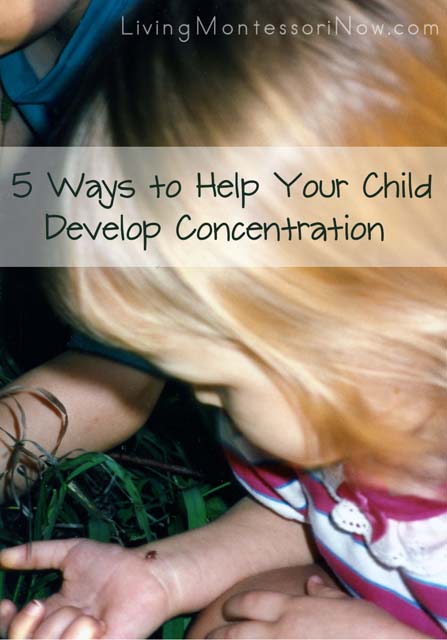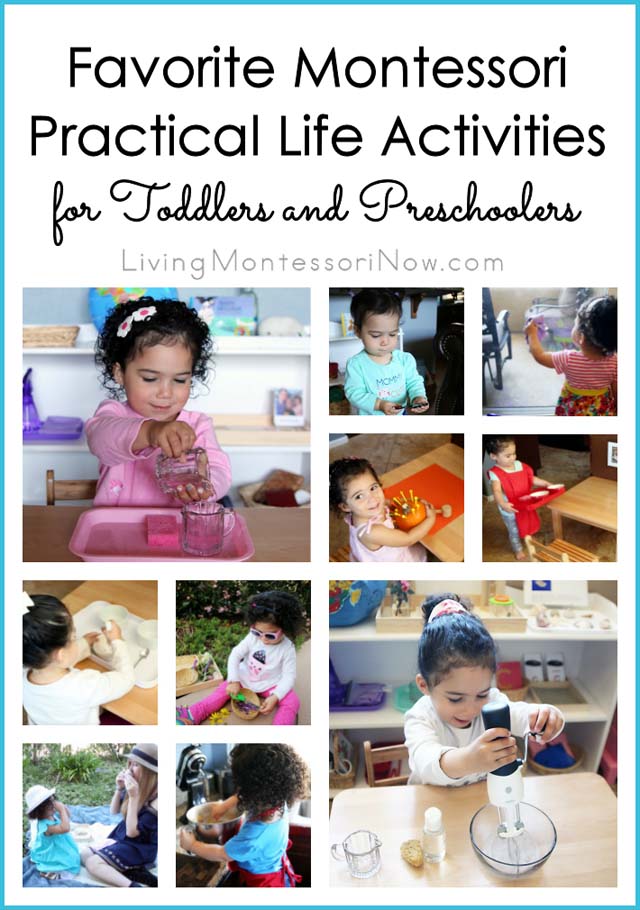One of the most helpful qualities your child can have for any type of school experience is the ability to concentrate. Fortunately, there’s a lot you can do at home to help your young child develop concentration.

Will (7) and Christina (2) in the summer of 1992.
I’m going to share some tips that work well at any time of the year. Right now, it’s summer vacation for many children, and it will be summer vacation soon for many others. Whether you want your young child to be ready for preschool (traditional or Montessori), ready for traditional school, or ready for homeschool at the end of the summer, the best quality to focus on is helping your child develop concentration.
Update: John Bowman has a great section on concentration and normalization in his Montessori at Home eBook. It includes a link to his post on the same topic at 1+1+1=1. Luckily, you can read the excerpt from his book on “Concentration and Normalization” here at Living Montessori Now! You can find out even more about how concentration and normalization fit together in my post on “What Does the Montessori Term ‘Normalization’ Mean?”
Summer is an especially nice time to focus on concentration. You generally don’t have pressing educational objectives, and it’s a perfect time to simply follow your child’s interests. If your child is interested in a topic or type of work, he or she is more likely to concentrate for long periods (and increase the ability to concentrate along the way). When that happens, you just have to be careful not to interrupt.
Here are 5 ways to help your child develop concentration:
1. Prepare a Montessori-friendly home.
Whether you’re a parent or grandparent, you’ll find ideas and links in my post on “How to Set Up a Montessori Space at Home.”
2. Give lots of opportunities for your child to do practical life activities.
Many Montessorians talk about OCCI – order, concentration, coordination, and independence. Those are qualities children develop naturally by working uninterrupted with practical life activities. Here’s a post with more about “Practical Life Activities.”
It’s your choice whether you want to prepare a number of practical life trays or just incorporate practical life activities naturally into your daily home life. If you want to prepare some activity trays or lessons, you’ll find lots of helpful ideas here: Activities – Practical Life. Check out my post with “Favorite Montessori Practical Life Activities for Toddlers and Preschoolers.”
3. Follow your child’s interests.
This is important at any time, but I think it’s especially important during summer vacation. If you’d like to add educational activities during the summer, you could choose a simple Montessori-inspired unit study that follows your child’s interest at the time. You’ll find a list of my unit-study roundup posts (including some summery ones) here: “Should You Use Unit Studies?”
4. When your child is absorbed in an activity, don’t interrupt (and allow your child to repeat the activity as many times as he or she wishes).
I already mentioned not interrupting, but it’s such an important principle that I’m saying it again. Here’s a post that tells why it’s good to let your child repeat an activity over and over: “Encourage Your Child’s Sensitive Periods.”
5. Let your child spend lots of time outdoors in nature.
Maria Montessori emphasized the importance of children spending time in nature. The new movement to get kids outdoors also emphasizes the importance of kids spending time in nature. One of the symptoms of “nature-deficit disorder” is difficulty concentrating. Here’s a post with ideas for learning activities outdoors: “Montessori-Inspired Outdoor Environment.”
Amazon Affiliate:
Learn more about my eBook Montessori at Home or School: How to. Teach Grace and Courtesy!
If this is your first time visiting Living Montessori Now, welcome! If you haven’t already, please join us on our Living Montessori Now Facebook page where you’ll find a Free Printable of the Day and lots of inspiration and ideas for parenting and teaching! And please follow me on Instagram, Pinterest (lots of Montessori-, holiday-, and theme-related boards), and YouTube. While you’re here, please check out the Living Montessori Now shop.
And don’t forget one of the best ways to follow me by signing up for my weekly newsletter. You’ll receive some awesome freebies in the process!







I confess that I have interrupted. JDaniel looked like he was having so much fun.
Thanks for your comment, JDaniel4’s Mom. It’s easy to interrupt if you don’t consciously know not to. I think our natural instinct is to want to praise what children are doing well, or we might have something that we think needs to be done. Not interrupting is a wonderful Montessori principle, though … amazingly effective! 🙂
I need to focus on spending more time outdoors with my daughter and less time inside. We have been trying to take her to different places just as a way to get her out of the house. I really like this post because it has great ideas and I can get a different perspective. I also have to put more emphasis on following my daughters emphasis.
Thanks so much for your comment, Ruthy. It’s awesome that you’re working to get your daughter outdoors more. 🙂
I am so thankful for your support. This linky has brought lots of traffic to my blog, which has in turn inspired me to try to make fun activities to add each week.
Thanks for your kind comment, Eric! I’m so glad you’re getting extra traffic because of Montessori Monday … and I’m glad it’s inspired you to make more activities. I always enjoy seeing what you’ve linked up! 🙂
Thanks for the mention, Deb, and great post, as usual!
My pleasure, John! And thanks for your kind words. I hope everything’s been going well for you lately!:)
Thank you for more explanation which I hope will sink in someday soon! Thank you for writing so we can all understand Montessori and how it should be applied. Carolyn
Thanks, Carolyn! I really appreciate your encouragement for the work I do … and I love what you do, too! 🙂
Thanks for this post. This is a great reminder to Montessori parents and teachers of what we need to do to help our children succeed. It sounds so easy, but it takes a lot of work.